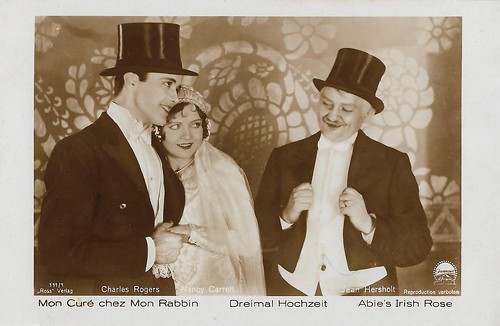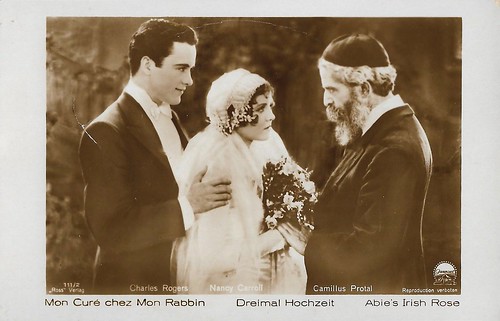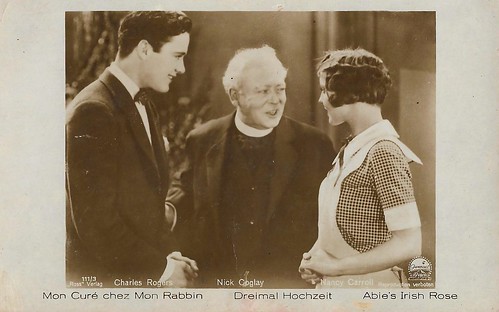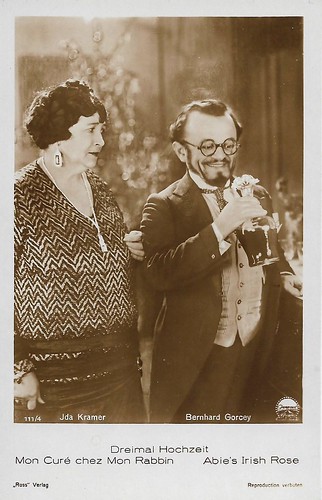Charles 'Buddy' Rogers and Nancy Carroll are the adorable stars of the American comedy drama Abie's Irish Rose (Victor Fleming, 1928). The Paramount production was based on a popular Broadway play. Ross Verlag in Berlin published this series of four sepia postcards on the film, with the film title in three languages: in French Mon Curé chez mon Rabbin (My priest at my rabbi) and in German Dreimal Hochzeit (Three times wedding).

German postcard by Ross Verlag, no. 111/1. Photo: Paramount. Publicity still of Charles Rogers, Nancy Carroll, and Jean Hersholt in Abie's Irish Rose (Victor Fleming, 1928)

German postcard by Ross Verlag, no. 111/2. Photo: Paramount. Publicity still of Charles Rogers, Nancy Carroll and Camillus Proctal in Abie's Irish Rose (Victor Fleming, 1928).
The comedy Abie's Irish Rose (Victor Fleming, 1928) is a early talking (part-talkie) film, based on the play Abie's Irish Rose by Anne Nichols, depicting the tumult that arises with the marriage of a young Jewish man and a Catholic Irish girl. Although initially receiving poor reviews, the Broadway play was a commercial hit, running for 2,327 performances between 23 May 1922, and 1 October 1927, at the time the longest run in Broadway theatre history.
The film version of Abie's Irish Rose is quite faithful to the play. Bernard Gorcey and Ida Kramer, who played the Isaac Cohens during the original Broadway run of the show, reprised their roles in this film. During World War I, Jewish Abie Levy (Charles 'Buddy' Rogers) is wounded in combat. While recovering in a hospital, he meets Catholic Rosemary Murphy (Nancy Carroll). They fall in love, return to the United States, and get married in an Episcopal church in Jersey City.
Abie takes Rosemary to his home and to appease his father, he introduces her as his sweetheart, Rosie Murpheski. They are then married by a rabbi (Camillus Pretal). Then Rosemary's hot tempered father, Mr. Patrick Murphy (veteran actor J. Farrell MacDonald) arrives with a priest (comedian Nick Cogley of Mack Sennett's troupe at Keystone). Amid discord and discontent, the young people are married again, this time by the priest.
Disowned by both families, Rosemary and Abie are befriended only by Mr. and Mrs. Isaac Cohen (Bernard Gorcey and Ida Kramer). On Christmas Eve, the Cohens and their rabbi persuade Solomon Levy (Jean Hersholt) to see his son and his new grandchildren; the priest urges Patrick Murphy to do the same. This surprise visit begins in acrimony but ends peacefully as Rosemary presents her newborn twins: Patrick Joseph, named for her father, and Rebecca, named for Abie's dead mother, leaving both grandpas happy.
In 1946, the film was remade as Abie's Irish Rose (A. Edward Sutherland, 1946), with Richard Norris and Joanne Dru. This version, which updated the story to World War II, was produced by Bing Crosby. The film also inspired the weekly NBC radio series, Abie's Irish Rose, which ran from 24 January 1942, through 2 September 1944. Faced with listener protests about its stereotyped ethnic portrayals, the radio series was cancelled in 1945.

German postcard by Ross Verlag, no. 111/3. Photo: Paramount. Publicity still of Charles Rogers, Nick Cogley, and Nancy Carroll in Abie's Irish Rose (Victor Fleming, 1928).

German postcard by Ross Verlag, no. 111/4. Photo: Paramount. Publicity still of Ida Kramer and Bernhard Gorcey in Abie's Irish Rose (Victor Fleming, 1928).
Sources: Afi.com, Wikipedia and IMDb.

German postcard by Ross Verlag, no. 111/1. Photo: Paramount. Publicity still of Charles Rogers, Nancy Carroll, and Jean Hersholt in Abie's Irish Rose (Victor Fleming, 1928)

German postcard by Ross Verlag, no. 111/2. Photo: Paramount. Publicity still of Charles Rogers, Nancy Carroll and Camillus Proctal in Abie's Irish Rose (Victor Fleming, 1928).
Just Married amid discord and discontent - again and again
The comedy Abie's Irish Rose (Victor Fleming, 1928) is a early talking (part-talkie) film, based on the play Abie's Irish Rose by Anne Nichols, depicting the tumult that arises with the marriage of a young Jewish man and a Catholic Irish girl. Although initially receiving poor reviews, the Broadway play was a commercial hit, running for 2,327 performances between 23 May 1922, and 1 October 1927, at the time the longest run in Broadway theatre history.
The film version of Abie's Irish Rose is quite faithful to the play. Bernard Gorcey and Ida Kramer, who played the Isaac Cohens during the original Broadway run of the show, reprised their roles in this film. During World War I, Jewish Abie Levy (Charles 'Buddy' Rogers) is wounded in combat. While recovering in a hospital, he meets Catholic Rosemary Murphy (Nancy Carroll). They fall in love, return to the United States, and get married in an Episcopal church in Jersey City.
Abie takes Rosemary to his home and to appease his father, he introduces her as his sweetheart, Rosie Murpheski. They are then married by a rabbi (Camillus Pretal). Then Rosemary's hot tempered father, Mr. Patrick Murphy (veteran actor J. Farrell MacDonald) arrives with a priest (comedian Nick Cogley of Mack Sennett's troupe at Keystone). Amid discord and discontent, the young people are married again, this time by the priest.
Disowned by both families, Rosemary and Abie are befriended only by Mr. and Mrs. Isaac Cohen (Bernard Gorcey and Ida Kramer). On Christmas Eve, the Cohens and their rabbi persuade Solomon Levy (Jean Hersholt) to see his son and his new grandchildren; the priest urges Patrick Murphy to do the same. This surprise visit begins in acrimony but ends peacefully as Rosemary presents her newborn twins: Patrick Joseph, named for her father, and Rebecca, named for Abie's dead mother, leaving both grandpas happy.
In 1946, the film was remade as Abie's Irish Rose (A. Edward Sutherland, 1946), with Richard Norris and Joanne Dru. This version, which updated the story to World War II, was produced by Bing Crosby. The film also inspired the weekly NBC radio series, Abie's Irish Rose, which ran from 24 January 1942, through 2 September 1944. Faced with listener protests about its stereotyped ethnic portrayals, the radio series was cancelled in 1945.

German postcard by Ross Verlag, no. 111/3. Photo: Paramount. Publicity still of Charles Rogers, Nick Cogley, and Nancy Carroll in Abie's Irish Rose (Victor Fleming, 1928).

German postcard by Ross Verlag, no. 111/4. Photo: Paramount. Publicity still of Ida Kramer and Bernhard Gorcey in Abie's Irish Rose (Victor Fleming, 1928).
Sources: Afi.com, Wikipedia and IMDb.
No comments:
Post a Comment